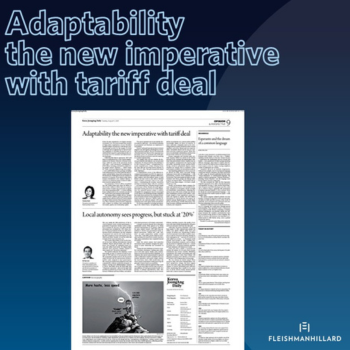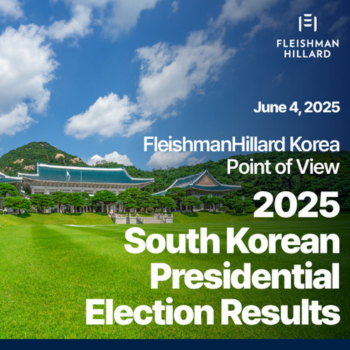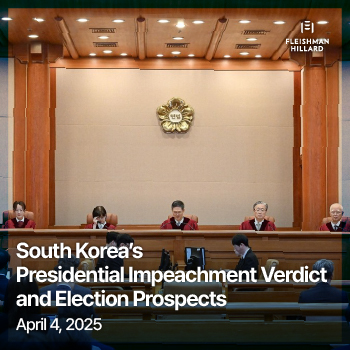
FleishmanHillard Korea 2022 Newsletter 2022 South Korea Presidential Election Results
Yoon Suk-yeol wins South Korean presidential race by narrow margin
On March 9th, 2022, Yoon Suk-yeol of the conservative People Power Party was elected as the 20th President of the Republic of Korea. He received 48.56% of the votes, beating the ruling party candidate Lee Jae-myung— who received 47.83% of the votes — by a slight margin of 0.73 percentage points, the narrowest margin of victory in South Korea’s presidential election history.
Yoon Suk-yeol previously served as the second Prosecutor General under the outgoing Democratic Party administration of President Moon Jae-in. Eight months after declaring his candidacy, President-elect Yoon will now lead the nation through a myriad of economic and national security crises wrought by the prolonged COVID-19 pandemic and the Russia-Ukraine crisis, among others.
Until his official inauguration on May 10th, the presidential transition committee will work to establish the key policy agendas for Yoon administration, in addition to restructuring the government to meet the needs of today’s changed times.
When the parties’ candidates were finalized on November 11th, Yoon led Lee in the polls by a margin of 11%. However, longitudinal surveys suggest support for Yoon fluctuated as variables such as party infighting and issues surrounding his wife affected swing voters, whose support was necessary for Yoon to win. In contrast, polls showed Lee enjoyed a robust support from his fervent base, remaining relatively unchanged despite the intensifying smear campaign by two sides. Although the results were difficult to predict due to the high turnouts during early voting, last-minute regional support, and the ballots of swing voters in their 20s, suggest a strong public desire for a change in government made the difference in the end.
Meanwhile, conflict and confrontation seem inevitable since the winner-take-all system chose a victor by a mere 0.73% lead despite the complex political terrain. As such, there is a growing argument underlining the need for a major overhaul of South Korea’s democratic electoral system implemented in 1987 (direct voting, single five-year term stipulated in the Constitution).
FleishmanHillard Korea has looked at the implications of the 20th presidential election from the perspective of the voters. Also, we have tracked new communication trends that have developed over the course of this election cycle and at Korean society’s expectations of their new leadership.



Looking back into the minds of the voters
The presidential election results reflect the complex interactions of various elements and influencing factors shaping the voters’ mindsets across the South Korean society. Both domestic and foreign corporations and other entities affected by Korean society need to understand the implications of these election result. Moreover, citizens — voters above the age of 18 as well as teenagers who proactively expressed their views online despite lacking the right to vote — actively engaged in political dialogue, communicating with each other throughout the election process. To understand the final election results, an analysis of the communication over the course of the entire election cycle is necessary. This comprehensive analysis will help to grasp the zeitgeist and the drivers of interaction between public interests, views, sentiments, etc.

Voters are asking: what benefits will help improve our quality of life?
The following is a word cloud composed of the keywords extracted from the 10 main pledges of the Democratic Party of Korea and is compared with that of the People Power Party. In fact, there is no significant difference between the keywords in the essence of the two parties’ promises, showing that this election moved away from traditional confrontation between parties based on the political ideologies of conservatives and liberals. Instead, it shifted toward a benefit election, as candidates competed on promises of more support for the people.

As voters become more interested in what specific benefits each of the candidates offer, politicians are expected to attract a higher interest in their ‘life-friendly’ agendas.

The candidate pledges most heavily reported by media were related to the 4-day work week, the legalization of tattoos, the revision of property and transaction taxes, health insurance for hair loss, a monthly salary of KRW 2 million for soldiers, and stronger reinforcement of false sexual crime accusation offenses. (Data analysis of Speech Log, press, Twitter, communities, YouTube, etc., Nov 29, 2021~Jan 27, 2022)
Candidates’ banners hung across the country also revealed this strategy to appeal to voters. While ideologies of ‘removing corruption’ and ‘conservative reform’ were fiercely polarized in the 19th presidential election, this 20th presidential election saw candidates put forward small promises more closely related to region and life, such as ‘new subway lines,’ ‘shopping complex construction,’ etc. It was necessary to provide a detailed strategy that clearly identified and understood the expectations of the target stakeholders, as well as which messages resonated most.
Voters do not believe that all promises will be fulfilled.
How likely is it that the elected candidate’s promises will be kept? President-elect Yoon made 200 state-wide promises with a price tag of KRW 266 trillion, including KRW 50 trillion for COVID-19 emergency relief. Considering the current domestic and international conditions, however, the people are well aware that it will be difficult to implement his original plan. In commemoration of the Moon administration’s 4th anniversary in May 2021, its pledge check site, <Moon Jae-in Meter, moonmeter.kr>, reported that 155 (17.47%) election promises were fulfilled even when the ruling party occupied 180 seats (60%), the highest number of seats in history.
Conflicts are getting more complex
South Korean regionalism, long seen as a significant voting tendency in all past presidential elections, was thought to be waning. Yet, this election saw historic regional divisions emerge at the last minute, as sign of the difficulty of breaking through regional voting patterns.

One of the commonly used expressions in Korean society is ‘Conflict Republic.’ The ‘Conflict Index’ calculated for 30 OECD countries in 2021 by the Federation of Entrepreneurs found that Korea ranked 3rd with the most conflicts, while ranking 27th in the ‘Conflict Management Index.’ In this presidential election, generational conflicts, gender conflicts, labor-management conflicts, and social class conflicts were highlighted as prominent agenda items in addition to regional conflicts, and candidates rushed to emphasize ‘conflict resolution,’ ‘unity,’ and ‘harmony.’
Ultimately, the election is viewed as having resorted to the politics of division. Yoon criticized those in their 40s and 50s in order to garner support from younger voters in their 20s and 30s as well as the elderly in their 60s. Lee responded to this by targeting the demographic in their 40s and 50s as a counter strategy. Additionally, the election divided the genders as well as generations by grouping millennials and Generation Z as a demographic with different interests from those in their 50s who hold positions of power and prestige in Korean society, especially in the corporate world. Many engaged in the politics of division, and likewise, many were critical of it. Such practices have been viewed as excluding those in minority groups– contract workers, sexual minorities, the disabled and others. In this aspect, such political practice is viewed negatively. While these group conflicts seem inevitable, it will be crucial to understand the core values of different groups and their relationships.
Voting for a candidate with different political views
This election cycle showed a departure from voting based on ideologies of the past. This is not only reflected in the pledges of each party, but the results of the “Presidential Election 2022 Survey of Policy and Values of Candidates and their Supporters.” This survey, conducted by the JoongAng Ilbo and the Korean Association of Party Studies on 14 policy issues, showed a significant gap between the policy views of the candidates and their supporters.

On a 10-point scale, 5 points indicate centrist political orientation, while points closer to 0 indicate a progressive position, and points closer to 10 indicate a conservative political stance. Supporters of the progressive Justice Party candidate Sim Sang-jung received an average point of 4.12, indicating that they were less progressive than the supporters of the ruling Democratic party’s Lee Jae-myung (3.89 points).
Voters do not necessarily like the candidates they support
In this election cycle, a fierce negative offensive campaigning was waged by Lee Jae-myung and Yoon Suk-yeol. The scandals consumed the public as they watched and listened as each new allegation was emerged. Both candidates became embroiled in controversy, making the candidate possibly the most unlikeable candidates in South Korean presidential election history. During the election process, the keywords ‘Daejang-dong’, ‘Deutsche Motors’, ‘Kim Hye-kyung (Lee’s wife)’ and ‘Kim Geon-hee (Yoon’s wife)’ impassioned the media and public opinion day after day. Despite the five televised debates, the public remained largely unpersuaded by their explanations, and eventually dubbed this election the most unfavorable election in history.

An interesting characteristic of such an election is that voters select the candidate who is least disliked and not who is most liked. As such, if the president-elect and the new government make the slightest mistake in their early days, public disappointment may swiftly shift to anger. Discontent with the new government could ignite anger and hatred from the 40% of the electorate – concrete supporter base of the defeated candidate. Moreover, the president elect will have a hard time demonstrating his leadership as the local elections will be held in June, only a few months following the presidential election.
While the candidates were focused on negative campaigning, a survey found that the top traits (29.8%) the public wanted from the newly elected president were fairness and common sense (Korea Information Research, survey of 2,022 adult men and women aged 18 or older, 03.02.2022). In the 2021 Corruption Perception Index (CPI) released by Transparency International (TI) in January 2022, South Korea ranked 22nd amongst the 38 OECD countries, receiving 62 out of 100 points. It should be noted that while the South Korean people perceive their society as highly corrupt, they also have high expectations for transparency, fairness, and common sense.
Maximized online community activities and forums steer public opinion, while traditional media make advancements in the COVID-19 era
Online communities and social media were very active in this election. Memes were created and circulated in short form videos. Further, candidates actively campaigned online by creating accounts on various social media platforms, distributing their own contents and memes. However, seeing that the highly ranked user IDs on the ‘Lee Jae-myung Game’ were covered with scandal-related keywords such as ‘thedisappearanceoftenportionsofsushi’ (reference to controversies regarding large meal expenses using public funds) and ‘iwanttouseacorporatecard’ (reference to use of government-issued corporate cards for Lee’s wife’s private expenses), we are reminded that there needs to be caution and preparation for risk management when hosting live events that directly engage users.

Notably, perhaps due to social distancing measures, the ratings for the first televised presidential debate on February 3 reached 39%, the second highest rating in history since the 15th presidential election in 1997. (The first debate in the 19th presidential election received 22.1%). In line with the “cross platform” trend of consuming the same or similar types of contents across different mediums utilizing TV, mobile, and PC simultaneously, it is no longer unusual for voters to watch TV while communicating in the comments section of YouTube channels that broadcasters provide through “one- source multi-casting” – broadcasting the same contents across wide spectrum of distribution channels.
Discussions on online forums were also very active during this election, with users on different sites such as Clien, Bobae Dream, Ppomppu, FM Korea, MLB Park, Ruliweb, and Yeosung Sidae sharing and evaluating the activities and statements of each candidate and party in real-time. Such active online discussions strengthened confirmation bias as users of each community reinforced like-minded support for the candidate and political party favored in the said community, while strongly rejecting candidates from the other side (Lee Jae-myung even posted directly on DC Inside and Yeosung Sidae as part of his non-face-to-face campaigning). Algorithms on YouTube, Facebook, and Instagram also drew attention as examples of online platforms increasing confirmation bias. Concerns were raised regarding the platform’s algorithms automatically playing only related videos if users watched two or three videos supporting a particular candidate. This is a selective exposure issue that will require the attention of content platforms and users.
Conditions for a new kind of leadership: inclusion, cooperation, and a global perspective
More than ever, South Korean society expects leadership marked by unity and cooperation from the 20th president of South Korea. The President-elect’s foremost priority will be understanding the minds of the voters who didn’t vote for him, especially those in their 20s and 30s. Despite the tasks ahead, there is a lack of funding and other hurdles. If his party pursues politics of division to win the upcoming local elections in June, the fragmentation and conflict within the nation will become far more serious. While the Moon administration encouraged inclusion in its messaging, the lack of follow-through was a key mistake that exacerbated the political division that led to presidential election results.
In South Korean society, two groups co-exist. One group has lived through the country’s industrialization starting in the 1960s and democratization in the 1980s and are influenced by the ideologies and values of those eras. A second group of people have high anxiety about their future. Pledges of short-sighted populist policies to win favor from voters based on personal gains and benefits will put a strain on the administration, and eventually, burden future generations to come.
The graphic below is a “topic network,” created using an AI-based modeling technique based on President-elect Yoon’s remarks. The topics below were directly mentioned during the campaign and can be interpreted as potential policies that will be implemented by the new government, as well as the connections between different issues that South Korean society needs to resolve. Despite analyzing data collected only within the last month, the number of topics is diverse, and networks between the topics are intertwining threads. The government’s policy coordination will need to not only be fine-tuned, but also have three-dimensional views on complex and diverse issues. The new administration will also need to demonstrate the ability to listen to diverse voices in South Korean society, truthfully assess and discuss areas of reform, and manage the complexity of different interests.

Additionally, amid the current socio- economic and rapid environmental changes such as climate crisis, energy transformation, economic polarization, and a low birth rate, it is necessary to shift to a new paradigm of cooperation, where the public and private sectors share resources, technology, and experience in order to achieve common goals for the good of South Korean society as a whole.
During this difficult period facing challenges in diplomacy, security, and a new economic Cold War which could dramatically affect domestic and global business environments, our hope is that the new government will demonstrate an era of leadership distinguished by inclusion, cooperation, and a global perspective.

To Download : [FH] 2022 South Korea Presidential Election Results_031022
Find Out More
-
Adaptability the new imperative with tariff deal
August 5, 2025


